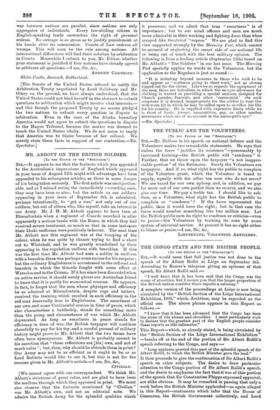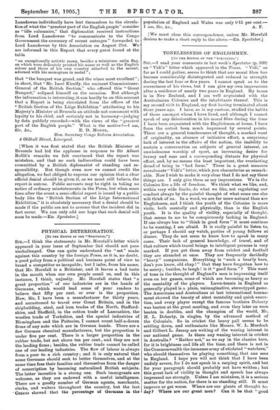THE CONGO STATE AND THE BRITISH PEOPLE. (TO THIS EDITOR
OP THE " spEcrerow'l
would seem that full justice was not done to the speech of Sir Albert Rollit at Liege on September 6th. According to Reuter's telegram giving an epitome of that speech, Sir Albert Rollit said :—
" I well know that it has been said that the Congo was the scene of atrocities, but I assure you that the larger proportion of the British nation consider these reports a calumny."
A complete version of the proceedings at Liege is now being circulated by the "British Section of the Liege International Exhibition, 1905," which, doubtless, may be regarded as the official one. The above phrase appears in this Report as follows :—
"I know that it has been advanced that the Congo has been the scene of vile abuses and atrocities. I most particularly wish to declare that the greatest part of the English people consider these reports as idle calumnies."
This Report—which, as already stated, is being circulated by the " British Section of the Liege International Exhibition " —breaks off at the end of the portion of Sir Albert Rollit's speech referring to the Congo, and says :-
" Long applause greeted this part of the splendid speech of Sir Albert Rollit, to which the British Minister gave the lead."
It then proceeds to give the continuation of Sir Albert Rollit's speech on other subjects. The desire to draw particular attention to the Congo portion of Sir Albert Rollit's speech, and the desire to emphasise the fact that it was of this portion of the speech that Sir Constantine Phipps expressed approval, are alike obvious. It may be remarked in passing that only a week before the British Minister applauded—as again alleged in this Report—sentiments which infer that the House of Commons, the British Government collectively, and Lord as "idle .calumnies," that diplomatist received instructions from Lord Lansdowne " to communicate to the Congo Government the summary of recent outrages" forwarded to Lord Lansdowne by this Association on August 21st. We are informed in this Report that every guest found at the table "an exceptionally artistic menu, besides a miniature satin flag, on which were delicately printed his name as well as the English colour and those of his own country attached to the mount, adorned with his monogram in metal"; that "the banquet was grand, and the wines most excellent"; in short, that " Mr. Imre Kiralfy, the eminent Commissioner- General of the British Section," who offered this " Great Banquet," eclipsed himself on the occasion. But although the information is interesting, it can hardly be on this account that a Report is being circulated from the offices of the "British Section of the Liege Exhibition" attributing to his Majesty's Minister at Brussels an attitude not consonant with loyalty to his chief, and certainly not in harmony—judging by data publicly recorded—with the views of the " greatest part of the English people." What is the motive ?—I am,
Sir, &c., E. D. MOREL, [When it was first stated that the British Minister at Brussels had led the applause in response to Sir Albert Rollit's remarks we felt convinced that the report was mistaken, and that no such indiscretion could have been committed by a British diplomatist of standing and re- sponsibility. But though even now we cannot credit the allegation, we feel obliged to express our opinion that a clear official denial should be given if, as we must still believe, the report is untrue. Public servants may be right in taking no notice of ordinary misstatements in the Press, but when some time after the event a semi-official report is issued by a public body like the " British Section of the Liege International Exhibition," it is absolutely necessary that a denial should be made if the public are not to assume that the incident did in fact occur. We can only add our hope that such denial will soon be made.—ED. Spectator.]











































 Previous page
Previous page